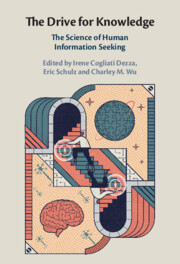Book contents
- The Drive for Knowledge
- The Drive for Knowledge
- Copyright page
- Contents
- Figures
- Tables
- Notes on Contributors
- Preface
- Part I What Drives Humans to Seek Information?
- Part II How Do Humans Search for Information?
- Part III Which Machinery Supports the Drive for Knowledge?
- Chapter 9 Information-Seeking in the Brain
- Chapter 10 Attention as Rational Choice
- Chapter 11 Seeking Inner Knowledge
- Chapter 12 Edgework
- Future Challenges
- Index
- References
Future Challenges
from Part III - Which Machinery Supports the Drive for Knowledge?
Published online by Cambridge University Press: 19 May 2022
- The Drive for Knowledge
- The Drive for Knowledge
- Copyright page
- Contents
- Figures
- Tables
- Notes on Contributors
- Preface
- Part I What Drives Humans to Seek Information?
- Part II How Do Humans Search for Information?
- Part III Which Machinery Supports the Drive for Knowledge?
- Chapter 9 Information-Seeking in the Brain
- Chapter 10 Attention as Rational Choice
- Chapter 11 Seeking Inner Knowledge
- Chapter 12 Edgework
- Future Challenges
- Index
- References
Summary
This book has covered a wide range of new and exciting research in the science of information-seeking. Yet many open questions still remain. For example, how is information-seeking related to reward-seeking? What are the principles that enable us to acquire useful information with computational efficiency, despite possessing limited cognitive capacities and knowledge? Which aspects of our neural machinery are unique to information-seeking, and what is shared across other cognitive systems? How does the science of information-seeking inform important societal issues, such as fake news, conspiracy theories, and education?
- Type
- Chapter
- Information
- The Drive for KnowledgeThe Science of Human Information Seeking, pp. 279 - 290Publisher: Cambridge University PressPrint publication year: 2022

